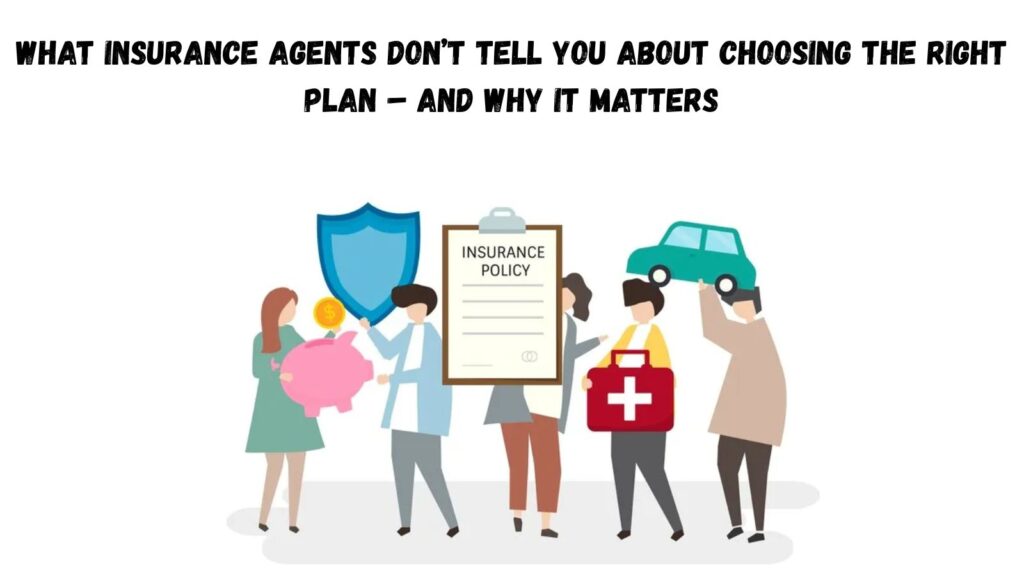When it comes to choosing the right insurance plan, whether for health, auto, or life, many people often feel overwhelmed. Insurance agents, while experts in their field, may not always provide the full picture when it comes to selecting the plan that’s truly right for you. This article will cover key details that insurance agents may not share. We’ll explain why these points matter and how you can use this information. This way, you can make smart choices that save you time, money, and trouble later on.

The Hidden Truths of Insurance Plans
Contents
- 1 The Hidden Truths of Insurance Plans
- 1.1 1. Not All Plans Are Created Equal: What You Don’t Know Can Cost You
- 1.2 2. Hidden Fees and Coverage Gaps in Health Insurance
- 1.3 3. Life Insurance and The Fine Print: Why You Should Read Carefully
- 1.4 4. Auto Insurance: Understanding Comprehensive and Collision Coverage
- 1.5 5. The Myth of “Cheapest is Best”
- 1.6 6. Pre-existing Conditions and Coverage Limitations
- 1.7 7. Agent Commissions Can Influence Recommendations
- 2 Why It Matters: The Financial and Emotional Impact of the Right Insurance Plan
- 3 Real-Time Examples: What Happens When You Choose the Wrong Plan
- 4 Conclusion: Take Control of Your Insurance Choices
- 5 Frequently Asked Questions
1. Not All Plans Are Created Equal: What You Don’t Know Can Cost You
One of the first things insurance agents often don’t tell you is that not all insurance plans are equal, even if they seem like they are. Take health insurance as an example. Many people assume that the least expensive premium is always the best option. However, lower premiums often come with higher deductibles and out-of-pocket costs. This means, while you’re saving on your monthly premium, you could be spending significantly more in case of an emergency or a health issue.
For example, let’s consider two health insurance plans: one with a $200 premium and a $10,000 deductible, and another with a $400 premium and a $3,000 deductible. The cheaper plan seems like a good deal at first. But if you need to stay in the hospital or visit the doctor often, the high deductible can make costs add up fast.
2. Hidden Fees and Coverage Gaps in Health Insurance
Insurance companies often hide additional fees or gaps in coverage that become apparent only after you’ve signed up. This may include hidden co-pays. It might also have limits on some treatments or exclude pre-existing conditions. Some health insurance plans don’t cover mental health or fertility treatments. They may only allow a few visits to a specialist.
Real-Time Example: Consider the story of Samantha, a woman diagnosed with breast cancer. She opted for a health plan based on its low monthly premium. When she got her diagnosis, she learned her insurance wouldn’t cover treatment until she paid a high deductible. This caused her financial strain. She had a set number of chemotherapy sessions. This meant she had to find ways to pay for extra treatments herself.
3. Life Insurance and The Fine Print: Why You Should Read Carefully
Life insurance is a long-term commitment. Understanding the details can help you avoid surprises. Many consumers often confuse term life and whole life insurance policies. Term life insurance covers you for a set time, like 10, 20, or 30 years. Whole life insurance lasts a lifetime but costs more in premiums.
Agents might push whole life policies because they earn higher commissions. However, term life insurance is often more affordable and better for your needs. Another thing that’s often left unsaid is that not all life insurance plans pay out as expected. It’s crucial to check if the plan you’re considering has any exclusions that could invalidate your policy.
4. Auto Insurance: Understanding Comprehensive and Collision Coverage
With auto insurance, the devil is in the details. Many car insurance policies might offer an all-inclusive “full coverage” plan, but it might not cover everything you think it does. “Full coverage” typically includes liability insurance, collision coverage, and comprehensive coverage. However, it might not cover incidents like flood damage or some types of theft.
Fun Fact: Did you know that nearly 25% of U.S. drivers don’t carry enough auto insurance to meet their state’s minimum requirements? It’s not just about choosing a plan based on price but also understanding the types of coverage you need. And in case you didn’t know, if your car is paid off, you don’t necessarily need collision coverage. That’s a money-saving tip agents might not readily share!
Real-Time Example: John had a car accident and thought his full coverage would take care of the damage. His insurance policy didn’t cover engine repairs. The accident was seen as a mechanical failure, not a collision. John was left footing the bill, even though he was paying for “full coverage.”
5. The Myth of “Cheapest is Best”
Some agents may urge clients to choose the cheapest plan. They often overlook important factors. These include the customer’s long-term needs, available discounts, and the insurer’s reputation for paying claims. Cheaper insurance premiums often mean fewer perks or higher out-of-pocket costs in times of need.
6. Pre-existing Conditions and Coverage Limitations
Some insurance plans won’t cover conditions you had before signing up. Also, many providers require waiting periods before you can claim benefits for these conditions.
Real-Time Example: A person with diabetes might face higher premiums or be denied coverage when getting a new health insurance plan. This is something that often comes as a surprise once the person requires treatment for their condition.
7. Agent Commissions Can Influence Recommendations
Insurance agents usually work on commission. This means they earn a percentage of your premium. This incentive can sometimes lead agents to recommend policies that may not be in your best interest but are more profitable for them.
Why It Matters: The Financial and Emotional Impact of the Right Insurance Plan
Understanding the insurance plan you choose is crucial not just for your wallet, but for your peace of mind. A poorly selected plan can lead to unexpected medical bills, financial stress, and emotional strain. If your car is totaled in an accident, a cheap insurance policy that doesn’t cover the cost of a new vehicle can put you in a difficult financial situation.
A well-chosen insurance plan can protect your assets, your health, and your family’s future. Therefore, it’s vital to have a deep understanding of what each plan entails, especially beyond the monthly premium.
Real-Time Examples: What Happens When You Choose the Wrong Plan
Case 1: A Medical Disaster Laura, a 35-year-old freelance graphic designer, chose a low-cost health insurance plan. She felt healthy and rarely saw doctors.
When she got a chronic condition, she learned her plan didn’t cover specialty care. This meant she had to pay thousands from her own pocket. Had she chosen a slightly more expensive plan with a broader coverage network, she would have saved more in the long run.
Case 2: Life Insurance and the Coverage Gap Tom bought a life insurance policy when his kids were young. He thought it would cover their education and living costs if something happened to him.
Sadly, he never looked to see if his life insurance had any clauses. For example, it could exclude coverage for deaths from certain causes, like suicide within the first two years. His family was left without the financial safety net he intended.
Conclusion: Take Control of Your Insurance Choices
Choosing the right insurance plan is not a simple task. Insurance agents can give useful info, but it’s up to you to read the fine print and ask the right questions. Don’t settle for the cheapest option without considering the long-term implications. Take your time, compare policies, and ensure that you’re covered in all the areas that matter most to you.
Top 5 Myths About Car Insurance You Need to Stop Believing
Frequently Asked Questions
Premiums vary based on factors like coverage limits, deductibles, and the insurer’s risk assessment. A lower premium often means higher out-of-pocket costs and fewer benefits.
Can I switch my insurance plan mid-year?
Yes, you can switch your insurance plan, but it may involve penalties or waiting periods depending on the type of insurance. Be sure to check your current policy’s terms before making any changes.
How do I know if I need a supplemental insurance plan?
If your primary insurance plan doesn’t cover all your medical needs or you have a high deductible, a supplemental insurance plan may be a good idea.
What is a deductible, and why does it matter?
A deductible is the amount you must pay out-of-pocket before your insurance kicks in. It can greatly impact your overall costs, so understanding it is crucial when choosing a plan.
To save money, try these tips:
Raise your deductible.
Bundle your policies.
Shop for the best deals.
Use available discounts.
When you know the details of insurance plans, you can make smart choices. This helps you get the right coverage, avoid extra costs, and feel good about your financial future.

